Issue 3- The Dark History of The Comic Code Authority
Ah, the Comic Code Authority. What can I say… The Comic Code Authority…
Fuck the Comic Code Authority.
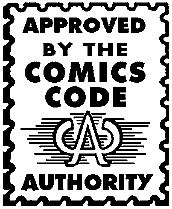
(Avert yer gaze from this dark, unholy sigil!)
What is...was the CCA?
Ahem, excuse my vulgar language but I can’t express how much I despise the CCA both in concept and in it’s history.
From 1954 to 2011, the CCA stood as the self regulating body that judged comics based on their version of “ethics and morals”. Comic publishers submitted their issues for approval so that they could be “deemed” safe for the mass market.
In theory, this meant that any comic sold with their seal was safe for everyone to read. In practice this was censorship.
Seduction of the Idiots
In 1954, psychiatrist by the name of Fredric Wertham decided to write a book in which he found the root cause of the moral degradation of yesterday’s youth. Comic books.
Not just happy to point out the obvious, that there was horror and dark themes in horror comics and violence and crime in well, crime comics, Wertham also had another bone to pick. Comic’s led to homosexuality. That’s right, Batman and Robin were gay in his eyes and were meant to corrupt you!
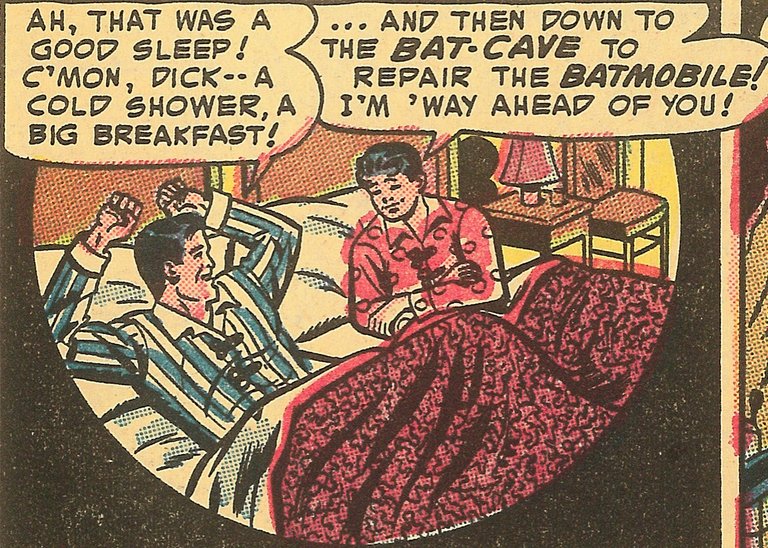
(Ok, so maybe scenes like these didn’t help, but it was the 1950’s! And this wasn’t even the worst of em!)
Oh, not to mention all the bondage in Wonder Woman. Ok, that was true, but he also suggested her strength and independence made her a lesbian. Because being strong willed woman meant there was something wrong in those days.
The book spread like wildfire across the nation with parents calling on the government to respond to these accusations.
To put it frankly, the book was a complete sham. One reviewer, years later, said Wertham "manipulated, overstated, compromised, and fabricated evidence" in order to prove his own moral outrage.
Creation of an (Unjust) Code
So with all this talk about the evils of comics, just from one man, the government realized that people had their first amendment rights to publish what they wanted...right?
Nope, the senate actually held hearings on how comics were causing delinquency. Fearful of outright bans, publishers decided to create the CCA.
The fear was not completely unfounded. Some cities had already begun banning comics with politicians and parents organizing public burnings of any issue they could get their hands on.
Taking cues from the Motion Picture Production Code, the CCA wrote up a set of rules that all comics had to cater too in order to gain their seal. Therin laid the major issue.
At the time, comic shops weren’t a thing. The average reader had to buy their issues either through their local magazine shop, or grocer. Since no “upstanding” proprietor wanted to peddle in what the public thought as smut or perversion, they accepted only those issues that the CCA branded “morally suitable”.
Unlike today's MPA rating system, there were no different levels of morality in comics which meant if a publisher wanted to sell something without the code, they were mostly out of luck, hence the forced censorship.
Broken Rules and Loopholes
Horror and crime comic sales were devastated over this, and even superhero stories were affected, yet because of their tales of heroes, they were the best sort of stories to thrive after the CCA went into effect. Supernatural creatures and events were almost all banned and violence in any form had to be toned down.
Political commentary was also sanctioned with all police, judges and government officials being portrayed as good, upstanding citizens no matter what.
Let’s not even talk about the racism, which was a thing before the CCA but was abused by many who wished to use the code to exclude black heroes or people of color in any form of authority.
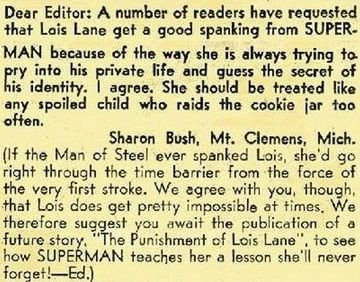
(And yet abusing women was perfectly fine!)
Take for example EC, or Entertainment Comics issue of Incredible Science Fiction #33 from 1956. In the story Judgement Day, a very anti-racist tale for the time, the hero and astronaut of the story was revealed to be a black man at the end. Judge Charles Murphy, the Comics Code Administrator at the time, demanded that he be changed to a white man or removed all together.
Obviously there were many problems with the code from the start, and even when some of the restrictions were lifted, the group still reacted relatively anal to anything they considered objectionable. Even if it came from the government.
Drugs Are Bad Mmmmkay
So in 1970, the Department of Health and Education asked Stan Lee to do a story on the dangers of drug abuse. So, Lee decided Spider-Man was the perfect comic to place the message in, albeit a bit more subtle than many comics would do afterwards. It happened in the background because Stan felt that if you tried to lecture or talk down to teenagers, the effect would backfire.
So , he wrote The Green Goblin Reborn Storyline starting with The Amazing Spider-Man #96.
The Comics Code Authority instantly rejected it on account of drug use, even though it was showing it in a bad light. Stan, in response, said “screw it” and published those issues without the CCA seal. DC’s head at the time, Carmine Infantino, was aghast at Marvel "for defying the code", stating that DC will not "do any drug stories unless the code is changed". Nobody else seemed to notice however and the story-line sold so well, the Code itself had to be revised.
True to their word, weeks later DC came out with their own anti-drug story, albeit a bit more obvious. And with it, came a CCA seal.
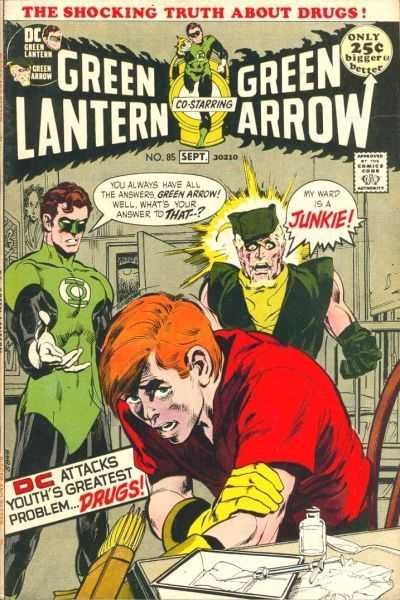
(Ok, a lot more obvious. I gift you with the meme worthy Green Lantern #85)
The End of a (Despicable) Era
By the 2000’s the code was a shadow of its former self. With new issues now being sold mainly at specialized comic shops, publishers had no reason to send their stories to the CCA, allowing them to tell more adult stories, free from the censorship of yesteryears. New imprints even from the big two, DC and Marvel, were skipping the seal with lines like Vertigo and Epic.
In 2001, Marvel was the first to split from the CCA, creating their own ratings system which had a suggestion on what age group a particular issue was suited for. DC followed 10 years later in 2011, and Archie, the last holdout, left a day later.
Ding dong, the witch is dead.
Thank you once again for reading about the history of this atrocity. Next time we’ll look at a character who broke a lot of the CCA’s rule, Jessica Jones.
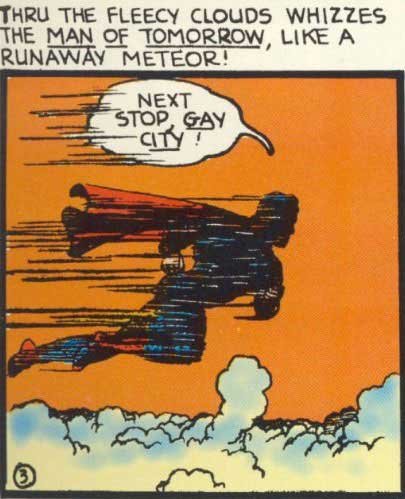
(And yet the CCA never considered Superman to be gay… Ok, sorry, but this was too fun not to post!)
Sources
http://muse.jhu.edu/article/490073
https://en.wikipedia.org/wiki/United_States_Senate_Subcommittee_on_Juvenile_Delinquency
https://web.archive.org/web/20091027160127/http://www.geocities.com/Athens/8580/kefauver.html
https://en.wikipedia.org/wiki/Comics_Code_Authority
https://en.wikipedia.org/wiki/Portrayal_of_black_people_in_comics#1956:Comics_Code_Authority_tries_to_censor"Judgment_Day"
https://en.wikipedia.org/wiki/Green_Goblin_Reborn!
Congratulations! Your post has been selected as a daily Steemit truffle! It is listed on rank 3 of all contributions awarded today. You can find the TOP DAILY TRUFFLE PICKS HERE.
I upvoted your contribution because to my mind your post is at least 48 SBD worth and should receive 171 votes. It's now up to the lovely Steemit community to make this come true.
I am
TrufflePig, an Artificial Intelligence Bot that helps minnows and content curators using Machine Learning. If you are curious how I select content, you can find an explanation here!Have a nice day and sincerely yours,

TrufflePiggreat article!
upvoted and resteemed !
the other day a friend of mine bought a copy of Seduction of the innocent an sent me a picture of it'll just told him: you should burn it!
Yeah, wonder why your friend bought it! Unless it was for research. But thanks for the comment!
yeah, he's a great ec collector..but even tho..!
and no worries, it was a great article! :)